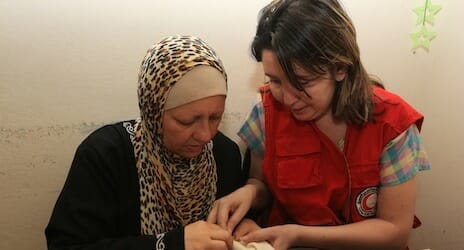By Penny Sims, IFRC and Vivian Tou’meh, SARC
This psychosocial support centre Dweila, Damascus, first opened in 2008 to help refugees fleeing Iraq. Now, while it still supports Iraqi, Somalia and Palestinian refugees, the centre has seen a big increase of Syrian people needing help.
Waad, the Syrian Arab Red Crescent (SARC) project coordinator says: “Psychosocial support is as essential to human beings as food and shelter.”
The centre sees many displaced Syrian people who need help to deal with stress, or simply someone to talk to. The volunteers have seen many children who are struggling to adjust to the new environment they are living in.
“Most of children who visit this centre suffer from depression, a sense of loss. They are unable to go to school. Others feel lonely since they are now spending most of their time without their parents, who are forced to work more hours during the day outside the home. Some feel uncomfortable or feel they lack independence or privacy, as one family is sometimes forced to live in one room or because they live with other families in the same place,” says Waad. “We cannot forget the new environment they live in and new community.”
The SARC has had to adapt its psychosocial services to new challenges brought by the crisis. Originally the service began with five centres in the areas of SitZeinab, Qamishli, Aleppo, Dwailaa and the Deir Ezzor city. The last had to be closed for some time due to the situation in this area in 2012. Now the service is expanding, and there are mobile teams in several regions including one in Deir Ezzor, one in Raqqah and two in Aleppo.
Challenges of the work
The Dweila centre is a happy, supportive environment, with many classes, play activities, even vocational training. But it faces many challenges.
“Volunteers today experience the same situation that beneficiaries face. At the same time they are dealing with their work which can involve difficult cases,” Waad says. “We see people with limb amputations. The situation can sometimes lead to aggressive behaviour.”
This centre has helped over 1,000 people just in the first five months of this year. It is able to run thanks to support from the Danish Red Cross. “If no-one supported this project, it would be closed,” says Waad. More than 740 people have taken classes here in the last year, and over 500 have taken part in creative groups and classes. Over 1,915 children have come here for play activities. The project is reaching a huge amount of people in just one suburb of Damascus.
People attending the centre can also learn valuable vocational skills. There are classes in IT, English language and handicraft skills. At the IT classes people can train for their International Computer Driving Licence, to add a skill to their CV.
Amal is one success story from the project. After being displaced, she was very depressed, struggling to support her son and unable to afford proper food. Now she is financially independent. She makes and sells hand-crafted belts, scarves and lamps after learning these skills at the centre, and eagerly grabs any opportunity to speak in English to show her new language skills. The changes to her life show how vital this service is to the community, and how SARC volunteers are changing people’s lives.
Rasha’s women’s group
Rasha is a technical supervisor at the psychosocial support project, running several groups herself and supervising volunteers. She is a force of positive energy, encouraging the people she works with to talk about their problems, but also to manage them and find a way to return to a happier life.
“All of us have problems in our lives,” she says. “There are many things in your life you can focus on, but it is you who has the power to choose where your focus goes.”
One of the women from Rasha’s support group, Lama, lives in Dweila, an area that is still periodically hit by mortars. Where she lives borders East Ghouta, which sees a lot of tension. Naturally this has an effect on Lama’s wellbeing. Now she has been attending the centre for one month and can already see changes in herself.
“I feel now I am changed. Before I was negative, I used to feel tired all the time, but now I feel more positive about life,” Lama says. “The exercises we learn here are powerful. Before I came here, I was afraid, I would not have had the courage to speak to people. But now I can do this, I have confidence. I feel safe here and feel like I am with friends. I stop thinking about what’s going on, and I think about my friends here at the group.”
Badia has lost her family network due to the crisis. Her son-in-law died and another family member is missing. Many of her extended family fled to neighbouring countries. She says before she came to the centre she was frustrated and afraid, and was always sad. “I didn’t want to do anything around the house, I was always tired. I noticed even the way the dealt with the children was changing, I was different,” she says. “Now, here in the group, I feel like I’m part of a family. We are all friends here. We support each other. We learn ways not to focus on our problems, to find joy in other things.”[g_slider source=”media: 285,284″ limit=”2″ link=”lightbox”]



Discussion about this post